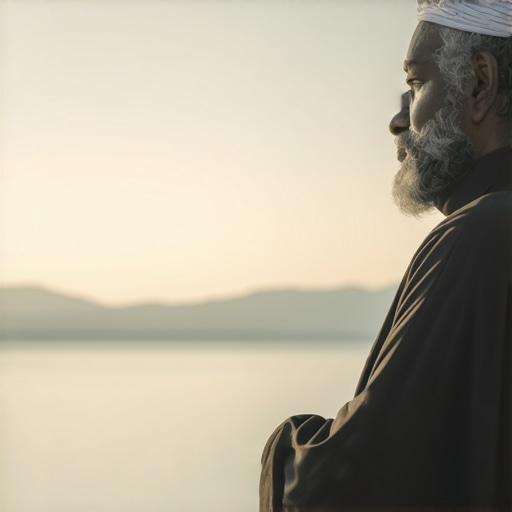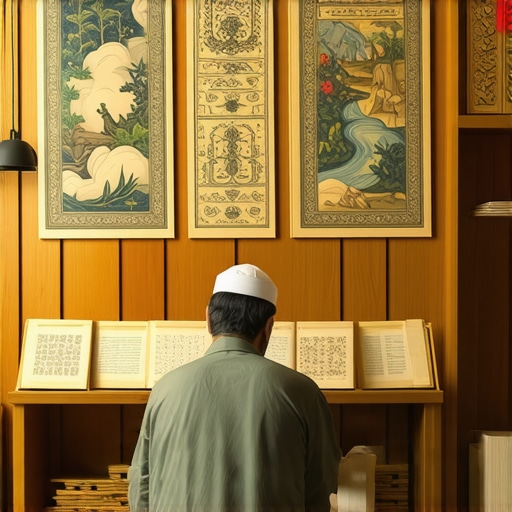My Personal Journey: When Dreams of Dead Relatives Changed My Perspective on Sacred Signs
It all started one restless night when I dreamt vividly of my late grandmother. In Islamic tradition, such dreams are often seen as sacred signs or divine messages. That dream left me pondering the deeper meanings behind encounters with loved ones who have passed away. Over time, I learned that dreaming of dead relatives isn’t mere coincidence but a spiritual communication that can offer guidance, comfort, or warnings.
Understanding the Significance of Dreaming About Dead Relatives in Islam
In my experience, these dreams hold profound significance. Islamic teachings suggest that dreams can be divided into three categories: true dreams, false dreams, and dreams from the nafs (self). When I saw my grandmother in a peaceful state, I felt a divine reassurance; it was a sacred sign indicating her blessings or a message from Allah. As I researched further, I discovered that many scholars interpret such dreams as divine messages or signs meant to guide the dreaming individual on their spiritual path.
What Do Sacred Signs from Dead Relatives Generally Indicate?
From personal reflections and authoritative sources like the Islamic Dream Dictionary, I learned that these signs often symbolize ongoing spiritual connections, divine warnings, or blessings. For example, dreaming of a deceased mother may symbolize her ongoing prayers for you or a divine message about your responsibilities. Sometimes, such dreams serve as reminders to stay steadfast in faith or seek forgiveness. The key is to interpret these signs with sincerity and seek guidance through prayer and reflection.
How Can I Recognize Genuine Divine Messages in My Dreams?
This question has intrigued me deeply. I found that recognizing authentic divine dreams involves purity of intention, sincerity in seeking truth, and consistency with Islamic teachings. Prophetic traditions emphasize that genuine divine dreams align with the Quran and Sunnah. I also consult trusted scholars or Islamic dream interpreters to help decode complex symbols and signs. For instance, dreaming of a peaceful prayer scene might symbolize divine approval or upcoming blessings, especially if it occurs after supplication or remembrance of Allah.
Why Do Some Dreams of Dead Relatives Bring Comfort While Others Cause Anxiety?
This is a common curiosity. From my understanding, dreams that bring comfort often reflect divine mercy or blessings, whereas unsettling dreams might be warnings or tests. It’s essential to approach all dreams with gratitude and seek refuge from Shaytan by reciting protective supplications, such as Mu’awwidhatayn. If a dream causes distress, I recommend consulting knowledgeable scholars and turning to prayer for clarity and peace of mind.
If you’re interested in exploring more about interpreting dreams in Islam, I encourage you to visit the Islamic Dream Interpretation page. Sharing our experiences can deepen our understanding and strengthen our faith. Feel free to comment below with your personal dreams or questions—our community thrives on shared wisdom and divine guidance.
Unveiling the Spiritual Significance of Dreaming About Deceased Loved Ones in Islam
Dreams featuring loved ones who have passed away are often profound and emotionally moving. In Islamic tradition, such dreams are not considered mere illusions but sacred signs or divine messages that can carry deep spiritual meanings. Recognizing these signs requires a nuanced understanding rooted in Islamic teachings and prophetic traditions. As I delved into this subject, I discovered that dreaming of dead relatives often signifies ongoing spiritual connections, divine blessings, or warnings from Allah, especially when interpreted with sincerity and faith.
The Nuance of Sacred Signs: What Do Dreams of Dead Relatives Really Convey?
These dreams can encompass various messages—some offer comfort, reassurance, or guidance, while others serve as warnings or calls for reflection. For example, dreaming of a deceased parent in a peaceful state may symbolize their continuous prayers for you or a divine blessing. Conversely, unsettling dreams might be tests or warnings from Allah to stay vigilant against spiritual pitfalls. According to Islamic scholars and dream interpreters, such signs are best understood through prayer, reflection, and consultation with knowledgeable persons. They emphasize that genuine divine dreams align with the Quran and Sunnah, and often require spiritual discernment to interpret correctly.
Practical Ways to Recognize Authentic Divine Messages in Your Dreams
Recognizing the authenticity of dreams involves several spiritual and practical considerations. First, purity of intention and sincerity in seeking divine guidance are essential. The Prophet Muhammad (peace be upon him) taught that true dreams are a part of Prophetic Revelation, especially when they align with Islamic principles. Second, consistency and clarity in the dream’s message reinforce its sacred nature. For instance, a dream of a peaceful mosque or a recitation of Quran might symbolize divine approval or upcoming blessings, especially if it follows supplication and remembrance of Allah. Consulting trusted Islamic dream interpreters or scholars can further aid in decoding complex symbols, like seeing a specific color or object, which often carry layered meanings. For more detailed guidance, exploring resources such as Islamic Dream Dictionaries can be very helpful.
How Can I Differentiate Between True Divine Dreams and Illusions?
This is a vital question for those seeking spiritual clarity. Experts suggest that true divine dreams are characterized by their alignment with Islamic teachings, their clarity, and the feelings of peace they evoke upon waking. Dreams that cause anxiety or confusion may require protective supplications like Mu’awwidhatayn and seeking refuge in Allah. Additionally, dreams that prompt positive actions—such as prayer, charity, or seeking knowledge—are more likely to be genuine messages from Allah. Remember, dreams are a form of communication, but they should always be approached with humility and reliance on divine guidance. For further insights, I recommend reading about dreams about losing teeth which often symbolize spiritual or worldly warnings.
If you wish to deepen your understanding of dream symbolism, I invite you to share your experiences or questions in the comments below. Our collective reflections can help strengthen our spiritual journey and bring us closer to divine truth.
Unraveling the Layers of Sacred Signs: What Makes a Dream of a Deceased Truly Divine?
As I continued my spiritual journey into the realm of dreams and divine signs, I realized that distinguishing authentic divine messages from mere illusions requires both spiritual maturity and a nuanced understanding of Islamic teachings. Dreams involving loved ones who have passed away are especially poignant, often stirring deep emotional responses. Yet, beyond the emotional impact, lies a layer of spiritual significance that demands careful discernment.
The Nuance of Clarity and Emotional Response in Dream Interpretation
One of the first indicators I learned to observe is the clarity of the dream and the feelings it evokes upon waking. Genuine divine dreams tend to leave a profound sense of peace, reassurance, and clarity. Conversely, dreams that induce confusion, fear, or anxiety may be overshadowed by Shaytan’s whispers or personal anxieties. This distinction reminds us to approach each dream with humility and to seek refuge in Allah from evil whispers.
Alignment with Islamic Principles and Prophetic Traditions
Another crucial aspect I discovered is ensuring the dream’s content aligns with Islamic principles and the teachings of the Prophet Muhammad (peace be upon him). For example, dreams that encourage piety, remind us of prayer, or reinforce Quranic values are often considered genuine messages. On the other hand, dreams promoting superstition or deviation from Islamic ethics should be approached with caution. Exploring resources like Islamic Dream Dictionaries can provide deeper insights into symbols that support authentic interpretation.
The Role of Sincerity and Intent in Receiving Divine Messages
My personal experience and scholarly teachings emphasize that sincerity and pure intention are vital when seeking divine guidance through dreams. When I pray and approach my dreams with humility, I find that Allah grants clearer signs and messages. This aligns with the prophetic tradition that sincere supplication and trust in Allah are essential for receiving authentic divine communication. Sharing experiences with others, as I often do in my community, helps us all refine our ability to recognize true signs from Allah.
Seeking Knowledge and Guidance from Trustworthy Scholars
Despite my efforts to interpret dreams personally, I have learned that consulting knowledgeable scholars or experienced dream interpreters is invaluable. Their wisdom helps decode complex symbols, such as colors, animals, or objects, that may carry layered meanings. For instance, dreaming of a snake might symbolize danger or spiritual testing, but only an informed understanding can reveal its true message. If you wish to explore more about this, visiting dream interpretations of loss and danger can expand your knowledge.
Encouraging Personal Reflection and Community Sharing
Finally, I find that personal reflection and sharing dreams within a trusted community enrich our collective understanding. When I openly discuss my dreams with friends and scholars, I gain new perspectives and reassurance. This communal approach aligns with Islamic ethics of seeking knowledge and mutual support in faith. I invite you to share your experiences or questions about divine signs in dreams—your stories may illuminate others’ paths and deepen our shared spiritual wisdom.
Remember, recognizing authentic divine messages is an ongoing journey that requires patience, sincerity, and continuous learning. To further explore this profound subject, I recommend visiting Islamic Dream Interpretation. Your questions and insights can help foster a vibrant community committed to understanding Allah’s signs through dreams.
< >
>
Exploring the Depths of Divine Revelation: How Sacred Signs from the Deceased Shape Our Spiritual Journey
In my ongoing quest to understand the profound symbolism embedded within Islamic dreams, I have encountered a fascinating dimension: the nuanced interpretation of dreams involving loved ones who have passed away. These dreams are not superficial illusions but layered with divine meaning, often requiring a refined spiritual discernment rooted in Islamic scholarship. As I delved deeper, I realized that recognizing authentic divine messages necessitates a confluence of sincerity, contextual awareness, and scholarly guidance.
The Spiritual Significance of Color, Symbols, and Context in Dreaming of the Dead
One of the most compelling aspects I explored is the significance of colors and symbols in such dreams. For instance, dreaming of a deceased relative dressed in white often signifies purity, divine mercy, or upcoming blessings. Conversely, a dark or ominous tone may serve as a divine warning or a test of faith. The context of the dream—whether it involves peaceful conversations, gestures of guidance, or unsettling scenes—greatly influences its interpretation. The key lies in understanding these symbols through the lens of Islamic theology, referencing works like the Islamic Dream Dictionary.
What distinguishes a true divine message from a mere psychological projection?
This question has been central in my reflections. Authentic divine dreams typically align with Quranic principles, evoke a sense of peace upon waking, and encourage piety or righteous action. They also tend to manifest after sincere supplication and reflection. Consulting scholars who specialize in Prophetic dreams in Islam has been instrumental in honing my discernment skills. These experts emphasize that genuine signs often reinforce Islamic ethics and prophetic teachings, serving as guidance rather than superstition.
Deepening Personal Connection: The Transformative Power of Recognizing Divine Signs
My personal journey has taught me that acknowledging divine signs requires humility and active engagement with my faith. When I experienced dreams of my grandmother in a state of serenity, I felt an overwhelming sense of reassurance, which invigorated my spiritual resolve. Sharing these experiences within a community of faith has further enriched my understanding, as collective reflection often unveils hidden layers of meaning. Such exchanges foster a sacred environment where divine messages are interpreted with reverence and sincerity, echoing the prophetic tradition of community-based spiritual discourse.
Practical Strategies for Authentic Dream Recognition and Protection
To safeguard oneself from deceptive visions, I practice reciting protective supplications like the Sunnah remedies for bad dreams. Maintaining purity of intention, engaging in regular prayer, and seeking knowledge from trusted Islamic scholars are vital steps. Moreover, keeping a dream journal helps track recurring symbols and themes, enabling a more nuanced understanding over time. In my experience, patience and ongoing study are essential in distinguishing authentic divine guidance from illusions or Shaytan’s whispers.
Invitation for Personal Reflection and Community Engagement
I invite you to share your own dreams and reflections, as collective wisdom often illuminates the path toward divine understanding. Remember, recognizing sacred signs is a continuous journey, marked by humility, sincerity, and diligent pursuit of Islamic knowledge. For further guidance, I recommend exploring the comprehensive resources available at Islamic Dream Interpretation. Your insights and questions can significantly contribute to our shared spiritual growth, fostering a community rooted in faith and divine wisdom.
< >
>
Things I Wish I Knew Earlier (or You Might Find Surprising)
1. Dreams Are More Than Just Sleep
Early in my spiritual journey, I underestimated the power of dreams. Over time, I realized that dreaming of dead relatives can be a sacred sign from Allah, offering guidance or reassurance, if interpreted with sincerity and faith.
2. The Importance of Sincerity
When I started approaching dreams with pure intent, I noticed clearer signs and messages. Genuine divine dreams often align with Islamic teachings and leave a peaceful feeling upon waking.
3. Symbols Carry Deep Meaning
Colors, objects, and scenes in dreams carry layered meanings. For example, a peaceful scene with a deceased loved one in white often symbolizes divine mercy or blessings.
4. Consultation with Scholars Matters
I’ve found that discussing dreams with knowledgeable scholars helps decode complex symbols. Their insights rooted in Islamic tradition make a big difference in understanding divine messages.
5. Protect Your Heart and Mind
Reciting protective supplications like Mu’awwidhatayn helps safeguard against Shaytan’s whispers and confusing visions, maintaining spiritual clarity.
6. Dreams Require Reflection and Patience
Interpreting dreams is a spiritual art that takes time and patience. I keep a dream journal, which helps me notice recurring themes and deepen my understanding.
Resources I’ve Come to Trust Over Time
- Islamic Dream Dictionary: This resource has been invaluable for understanding symbols like colors, animals, and objects in dreams, helping me interpret signs more accurately.
- Scholars and Islamic Dream Interpreters: Trusted scholars I consult have provided clarity on complex dreams, especially those involving divine signs from loved ones.
- Islamic Books on Dreams: Classic and contemporary Islamic literature deepen my understanding of prophetic dreams and divine signs, guiding me in my spiritual journey.
- Online Islamic Communities: Sharing dreams in trusted communities often brings new insights and reassurance, enriching my faith.
Parting Thoughts from My Perspective
Dreams of dead relatives in Islam are profound and layered with spiritual significance. Recognizing these divine signs requires sincerity, reflection, and sometimes scholarly guidance. They often serve as ongoing connections with loved ones, blessings, or warnings from Allah. My biggest takeaway is to approach these dreams with humility and trust in Allah’s wisdom, seeking guidance through prayer and reflection. If this resonates with you, I’d love to hear your thoughts or experiences. Feel free to share in the comments or reach out via contact, and may Allah bless your spiritual journey.


Reading through this insightful post resonated deeply with my own experiences of dreaming about passed loved ones. I recall a vivid dream of my father in a peaceful state, which brought me immense comfort and a sense of divine reassurance. It made me realize how these dreams serve as a spiritual bridge, reinforcing our faith and connection to Allah’s signs. The emphasis on sincerity and prayer really struck a chord, as I believe that approaching these dreams with pure intention is crucial for receiving genuine guidance. One challenge I often face is distinguishing between true divine messages and personal subconscious projections, especially when dreams are vague or mixed with fears. How do others ensure they interpret these signs correctly without falling into superstition? Would love to hear your thoughts and experiences—sharing stories like these can help us all refine our understanding and strengthen our faith.
This post resonates with me deeply, especially the emphasis on sincerity and proper interpretation of dreams involving loved ones. Recently, I had a peaceful dream where I saw my grandfather in a calm setting; it left me feeling reassured about his ongoing presence in my spiritual journey. It made me reflect on how such dreams can serve as blessings and reminders from Allah if approached with pure intentions. Sometimes, I find it challenging to differentiate between authentic divine signs and subconscious reflections, especially when the images are ambiguous. I wonder, are there specific prayers or mindfulness practices that help clarify whether a dream is from Allah or Shaytan? Additionally, how can we develop greater sensitivity to these signs without overanalyzing or falling into superstition? I believe that maintaining sincere supplication and seeking knowledge from trusted scholars can greatly assist in this discernment process. I welcome others’ insights on how they navigate these spiritual perceptions and any personal experiences that have helped sharpen their understanding.